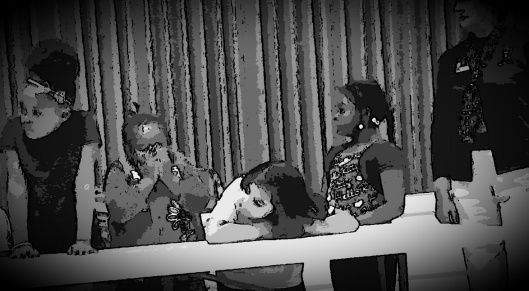 When the twins were in kindergarten they were separated between two classes across the hallway from each other. Victoria’s teacher was a soft spoken, cardigan wearing woman with great patience and tenderness. Vanessa’s teacher was a loud, hostile, bitter old lady with no patience for little kids or the learning process. As the school year wore on, Victoria would come home happy, holding up a finger painting she’d done and talking about how she couldn’t wait for school again tomorrow. Vanessa would come home with her head bowed, somber and clingy asking if she can stay home and never return to that mean place again.
When the twins were in kindergarten they were separated between two classes across the hallway from each other. Victoria’s teacher was a soft spoken, cardigan wearing woman with great patience and tenderness. Vanessa’s teacher was a loud, hostile, bitter old lady with no patience for little kids or the learning process. As the school year wore on, Victoria would come home happy, holding up a finger painting she’d done and talking about how she couldn’t wait for school again tomorrow. Vanessa would come home with her head bowed, somber and clingy asking if she can stay home and never return to that mean place again.
I thought Vanessa was simply having trouble adjusting; after all, some kids don’t take to socialization as well as others. But then the phone calls from Mrs. Bitter started to come in. Daily, I would get a call from a gruff, inpatient voice telling me how my daughter was hiding under her desk and refusing to come out or crying in a corner and cannot be swayed to move. Another time she called and said that Vanessa just wouldn’t stop crying, so Vanessa was separated from the group until she stopped being disruptive.
I finally had a meeting with the school and here is what they told me: “Mrs. Bitter can be a disciplinarian, but her numbers are through the roof; she forces her students to do the work by any means necessary, yes, she can seem a little harsh but she gets the job done.”

The school cared not that my daughter was frightened out of her wits by this overbearing, unnecessarily harsh woman. Mrs. Bitter yelled at the children without cause and humiliated them by calling them names and getting the other children to join in. I knew this from witnessing it myself when I came into the class to monitor Vanessa’s behavior. Mrs. Bitter was horribly impatient and totally unqualified to be a kindergarten teacher – she had no patience for the job. But out of fear and harsh punishment, her students had the highest academic performance rate in the entire school.
After months of being a confused first time parents, my husband and I finally told the school that we wanted our daughter taken out of that class immediately. Yes, Mrs. Bitter squeezed out high tests scores but she also crunched the spirits of tiny kindergarteners and that was not okay. The school loved this lady because her numbers were great, never mind that she abused the students.
I find this mindset prevalent in America. The most successful are the most abusive. This mindset has to stop. Abuse is not okay, even if it gets the job done. The job can be done with compassion, levelheadedness, grace with respect for humanity. The twin with the nice patient teacher did just as well as the twin with the mean impatient one, so why are we rewarding destructive pathways to success?

Our web-based lives further perpetuate this idea that cruelty as a strategy to produce perfection is okay. Increasingly our lives are maintained by algorithms, these complex applications choose our meals, mates, books, toys, fashion, schedules, careers, doctors, diagnoses, and prescriptions.
Technology is helpful and does create the feeling of ease and efficiency, hence my ability to post to this very blog right now. But computerized technology sends the message to its users that they can be as mechanically efficient both on line and off line. Educational systems are built entirely around the idea that pupils perform at the same scientifically established level. Exams transform human students into data elements that either successfully or unsuccessfully navigate algorithms.
We utilize computerized tools to demonstrate performance but the data is only half of the story. At work my performance is based on how well I navigate complex algorithms, not giving any thought to my humanity. If my report was done with accuracy, I’m good; no one cares that my grandma died, a colleague stole my idea, and I just found out that I have a serious medical condition. Human emotion is in play forever and always, yet our technological world turns a blind eye to the things that truly matter offline.

Social media is thought to produce a layer of humanity for us but it is really insufficient. Our social media profiles are heavily curated advertisements of ourselves. There is really no humanity in our social media. There is really nothing authentically social about it. We post our stances, arguments, and position on issues but we are not really socializing. We are gathering data and arranging pseudo committees to further digitize our lives. I hear that some authentic friendships are made through social media and this is encouraging. Some people really do get married as a result of meeting online. However, speak to these people and they will likely tell you that their relationship was “set up” or “initialized” online but it blossomed offline. Therefore, our online activity serve as a tool to be used to live our lives not to be lived through
Bottom line: your numbers, on paper, on social media, on spreadsheets, on data reports, can look awesome, but you as a human being can be doing horribly. It is everyone job to continually remind each other that our “numbers” don’t represent us fully. It is fine to use data as guide but data will never replace humanity.
